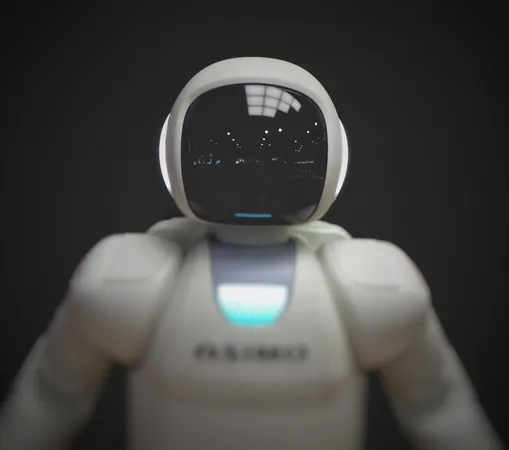
Unlocking the Mystery of Consciousness: How Robots Could Illuminate Our 'Sense of Self'
2024-11-18
Author: John Tan
Introduction
In a groundbreaking review published in Science Robotics, an interdisciplinary team comprised of a cognitive roboticist, a cognitive psychologist, and a psychiatrist has ventured into the intriguing realm of the 'sense of self' in humans. Their exploration seeks to leverage robotics as a unique lens to better understand this profound phenomenon.
The Human Sense of Self
The essence of being human is deeply intertwined with our innate 'sense of self'—the feeling of being a distinct entity that interacts with the world. We experience this consistent identity daily and perceive others as having their own selves too. This exploration posits that robots could serve dual roles: as physical embodiments mirroring facets of the human self and as experimental tools for psychological inquiries. The authors suggest a novel avenue for research: could we replicate elements of the human sense of self in robots?
The Research Team and Their Approach
Led by Agnieszka Wykowska from the Italian Institute of Technology, Tony Prescott from the University of Sheffield, and Kai Vogeley from the University of Cologne, the authors call attention to the critical interplay between bodily existence and self-perception. Emerging studies argue that our sense of self is multifaceted—comprising ongoing processes such as the feeling of body ownership and agency, which is the internal acknowledgment of control over our actions.
Robots as Models for Self-Understanding
Today's roboticists are ambitiously developing machines capable of distinguishing their bodies from others—a fundamental capability reflecting the self-other distinction—and recognizing the outcomes of their own actions—an embodiment of agency. This quest positions robots as promising models for understanding the cognitive mechanisms contributing to our sense of self.
Experimental Methods
The authors outline two pivotal methods for utilizing robots in this research. The first involves programming robots to emulate mental and neural processes linked to self-experience as outlined by psychology and neuroscience. Scientific evidence suggests that our sense of self emerges as the brain's best interpretation of sensory experiences, aiding in understanding one's role in generating those sensations. A robot, functioning as a physically interactive entity, becomes an intriguing platform to validate such theories.
The second method revolves around utilizing robots in psychological experiments wherein humans engage with them while the robots exhibit social behaviors, such as language communication and joint attention. These interactions could potentially reveal whether humans perceive these robots as social entities and if the mental frameworks they apply to robots mirror those used with other individuals.
Findings and Implications
Remarkable findings from Wykowska's team have indicated that humans sometimes experience a shared sense of agency with robots, particularly when functioning collaboratively and perceiving the robot as an intentional participant.
Moreover, the authors draw correlations between human developmental milestones—particularly the evolution of self-awareness—and the potential for imparting aspects of this awareness to robots. By age 4, children begin recognizing themselves as temporal beings with ongoing identities and understanding that others also possess selfhood.
Current Limitations and Future Prospects
Current investigations are underway to engineer memory systems in robots akin to human autobiographical memory. However, strides in this field are still preliminary; today's robots do not yet grasp their persistent existence over time or recognize others—be they humans or other robots—as possessing distinct selves.
Conclusion
As we delve deeper into the intersection of robotics and cognitive science, the implications of this research could extend beyond mere academic curiosity, potentially reshaping our understanding of consciousness, identity, and the very fabric of what it means to be alive. The future holds the promise of not only investigating the essence of our own selves but possibly creating machines that can share in this profound human experience.


 Brasil (PT)
Brasil (PT)
 Canada (EN)
Canada (EN)
 Chile (ES)
Chile (ES)
 España (ES)
España (ES)
 France (FR)
France (FR)
 Hong Kong (EN)
Hong Kong (EN)
 Italia (IT)
Italia (IT)
 日本 (JA)
日本 (JA)
 Magyarország (HU)
Magyarország (HU)
 Norge (NO)
Norge (NO)
 Polska (PL)
Polska (PL)
 Schweiz (DE)
Schweiz (DE)
 Singapore (EN)
Singapore (EN)
 Sverige (SV)
Sverige (SV)
 Suomi (FI)
Suomi (FI)
 Türkiye (TR)
Türkiye (TR)